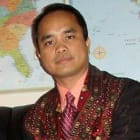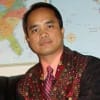commentary Commentary
Commentary: To be president? What Myanmar military leader's endgame may be
There has been, among others, one significant consistency in all the three military coups in the country’s history - 1962, 1988 and 2021 – says Dr Nehginpao Kipgen.
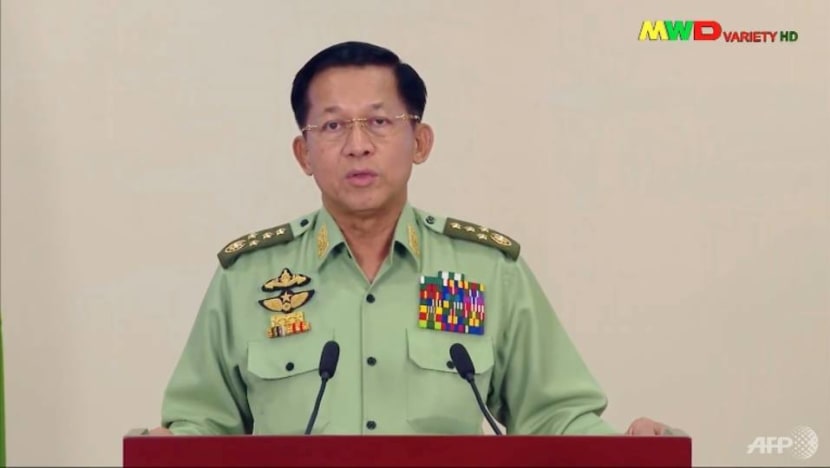
Myanmar military chief General Min Aung Hlaing declared that this time, things would be "different" from the army's previous 49-year reign, which ended in 2011 AFP/-
NEW DELHI: The Myanmar military’s justification for the coup are allegations of electoral fraud.
Prior to declaring a state of emergency on Feb 1, the military made three major demands of the National League for Democracy (NLD) government: To postpone the opening of parliament, disband the election commission and re-examine alleged voting irregularities under military supervision.
This angle has been widely reported following the coup. But little attention has been given to other potential ulterior motives of the military leadership, especially that of the commander-in-chief Senior General Min Aung Hlaing, now the chair of the 11-member State Administrative Council, a new name of the military junta, of which eight are from the military.
READ: Commentary: How Myanmar’s military leveraged the COVID-19 pandemic in its power grab
The media in Myanmar has been told by the new government it should not report its actions as a coup. It also should not refer to it as a military junta.
The Ministry of Information said in a statement to the Myanmar Press Council on Feb 12 that such use of “incorrect words” by the media are “acts of instigation that may arouse civil unrest” and are “against publishing laws”.
Despite this warning, there has been, among others, one significant consistency in all the three military coups in the country’s history - 1962, 1988 and 2021.
Following the 1962 coup, the military formed a junta called the Revolutionary Council (RC); the State Law and Order Restoration Council (SLORC) following the 1988 coup, which was changed to the State Peace and Development Council (SPDC) in 1997; and now the State Administrative Council.
ENTERING POLITICS
Unlike his predecessors, Min Aung Hlaing has openly expressed his desire to enter politics after retiring from the military.
Months before the Nov 8 general election, Min Aung Hlaing in his June interview with a Russian weekly said: “The first priority is to successfully hold the 2020 elections. Then, if there is trust, we might also have to consider how we could participate in politics.”
He had also said in the past that his military leadership could be helpful in politics.
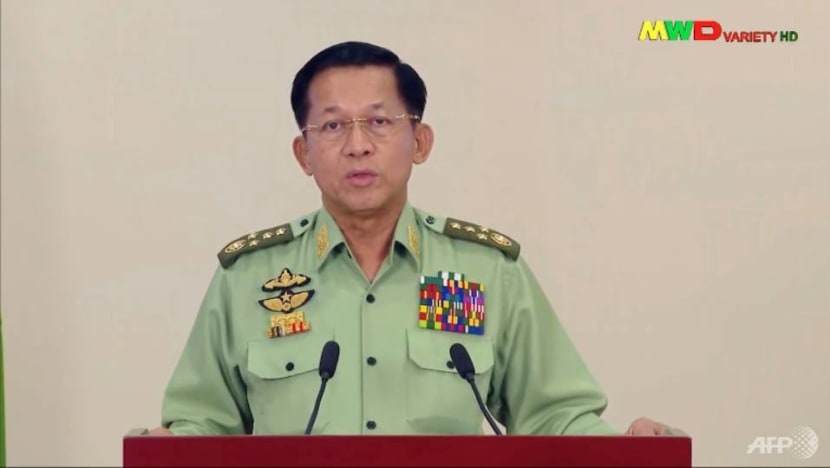
But the heavy defeat of the military’s proxy party, the Union Solidarity and Development Party (USDP) in the 2020 election suggested this prospect of him becoming President is almost zero.
The election results of 2015 and 2020 indicate the vast majority of the Myanmar electorates do not want or trust the military, its proxies or affiliates to rule the country.
READ: Commentary: US sanctions on Myanmar will not reverse the coup
Under such circumstances, the only possible way, under the military-drafted 2008 constitution, for Min Aung Hlaing to play a role in the civilian-led government is to be nominated as one of two vice-presidents reserved for the military.
Or to take charge of the ministries appointed by the military, that is, home, defence and border affairs.
But Min Aung Hlaing is unlikely to want any of these roles since that would be in essence a demotion. The role is also subordinate to the democratically elected or appointed civilian leaders.
RETURNING TO MILITARY RULE
The most practical way for Min Aung Hlaing to secure a position in politics he does crave is through undemocratic means. One such possibility is to establish a political environment similar to that leading up to the 2010 election.
Prior to the 2010 election, Aung San Suu Kyi was placed under house arrest by the SPDC regime. The authorities gave the NLD an option to expel her or de-register the party.
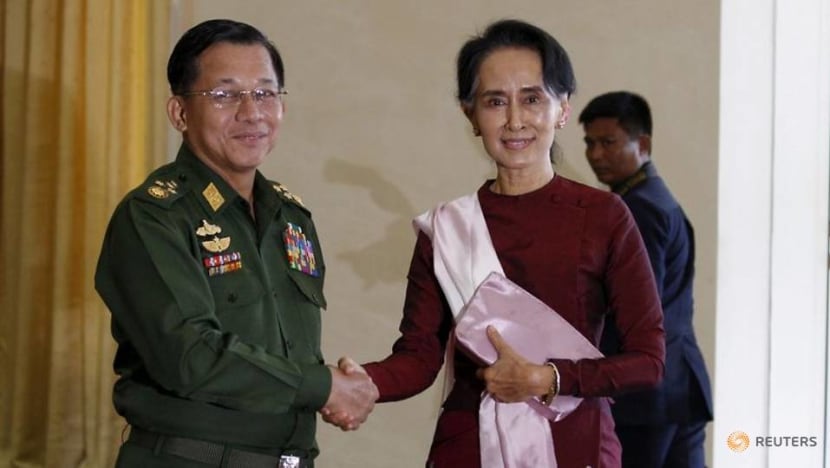
The party decided to de-register and boycott the election, along with some ethnic-based parties, mostly because of what it perceived as undemocratic election laws and partly because many of its prominent leaders were barred from the election.
This time around, at least until now, the military has brought two charges on Aung San Suu Kyi.
On Feb 3, she was charged with illegally possessing imported walkie-talkies, and on Feb 16, she was charged with violating the country’s Natural Disaster Law.
READ: Commentary: Myanmar resistance against coup taps on powerful ethnic nationalism with large grassroots base
The charges on the walkie-talkies, used by her bodyguards, carries a maximum of two years in prison.
And the Natural Disaster Law, which has been used to prosecute people violating coronavirus restrictions, carries a maximum of three years in prison. But with the changes in the penal code constituted following the coup, the military can detain her indefinitely.
THE POLITICS BEHIND IT
While the military has its own reasons for doing what it does, history tells us that the authorities may use these charges to advance its political agenda.
While she is unlikely to be imprisoned like in the past, these charges may be used for the justification and extension of her house arrest way beyond any future election.
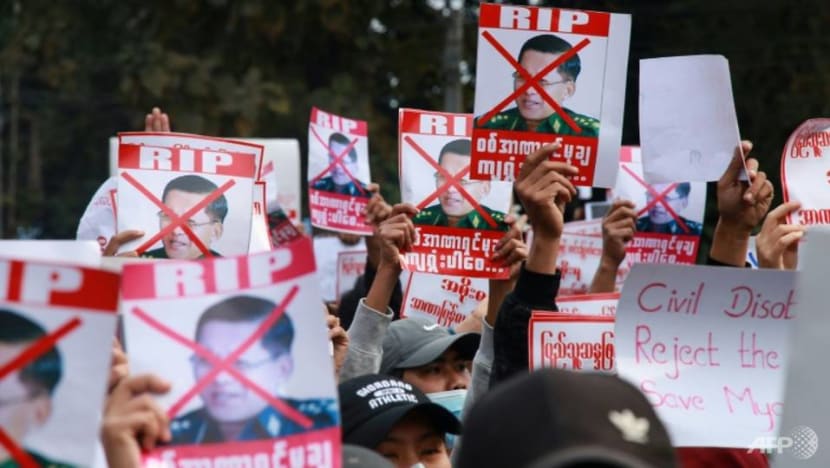
During its first news conference on Feb 16 following the coup, military spokesman Brigadier-General Zaw Min Tun reiterated that the military will hand power back to the election winning party, without giving a timeline.
The military, which had announced earlier that the emergency rule will last for a year, may indeed hold another election at the end of the one year.
It is certain that under a free and fair election, the NLD is most likely to win again in a landslide. In fact, the coup is likely to strengthen the NLD’s support base. But what is not clear is what new electoral laws the military may pass.
It is possible that such amendments may include barring anyone charged with a crime from contesting the election, like it did in the 2010 election. Or it may force the NLD to choose between Aung San Suu Kyi and registering the party to contest the election.
If history is a precedent, it is likely that the NLD will boycott any such election that bars its leader. If the NLD decides to take that route, it will become a win-win situation for the military-backed political party - either the USDP or a new proxy party.
READ: Commentary: Understanding its history of resistance rather than sanctions can help Myanmar now
READ: Commentary: A crackdown in Myanmar could spark a humanitarian crisis
Such an election will guarantee Min Aung Hlaing or his nominee the country’s presidency.
The coup ensures that Min Aung Hlaing’s tenure, which is due to end in July this year, is now indefinitely extended, and perhaps it may also lead to his ascendency to the presidency - the highest office in the land.
In fact, there was speculation Aung San Suu Kyi may have to offer the military leader the office of the president in order to reach a compromise agreement between the two opposing camps. But it did not materialise and Min Aung Hlaing chose another route.
Time will tell if the coup is indeed an attempt of the military leadership, particularly Min Aung Hlaing's, to further entrench its position under a guided electoral democracy.
The initial signs show that the country is headed in that direction.
Dr Nehginpao Kipgen is a Political Scientist, Associate Professor and Executive Director at the Center for Southeast Asian Studies, Jindal School of International Affairs, O.P. Jindal Global University. He is the author of three books on Myanmar, including ‘Democratization of Myanmar’.








